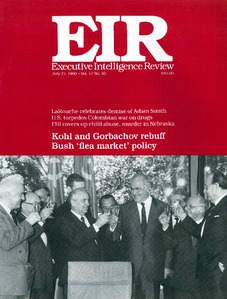Interviews
Fred Wojtalik
by David Cherry
The project manager for the Space Telescope Project says it’s too early to tell exactly why the telescope’s mirror is distorted.
Msgr. Sofron Dmyterko
by Maria Cristina Fiocchi
A bishop of the Ukrainian Catholic Church tells of his 23 years in prison in the Soviet Union, and the just-concluded Ukrainian meeting with the Pope in Rome.
Book Reviews
Economics as Soap Opera Won’t Wash
by Christopher White
The Politics of Rich and Poor: Wealth and the American Electorate in the Reagan Aftermath, by Kevin Phillips.
Departments
Andean Report
by Carlos Cota Meza
Venezuela Pumps Strategic Oil Reserve.
Report from Rio
by Silvia Palacios
Collor Surrenders Sovereignty.
Editorial
The Real Criminals behind the S&L Crisis.
Science & Technology
Water Development Projects Can Keep California Green
by Brian Lantz and Marcia Merry
Thanks to the current reign of environmentalism and eco-terrorism, parts of California are on the verge of turning back into desert, despite the fact that most Californians consider it urgent to build more dams, canals, and reservoirs—many of which have been on the drawing boards for decades.
Water Is Life Itself to California Agriculture
Water Projects Can Solve the Crisis
by Dave Kilber and Marcia Merry
No Legal Right to Water Means No Right to Life
How the courts are wrecking economic infrastructure.
Conservation Foundation Stopped Water Projects
Economics
U.S. Regime ‘In Despair’ as Depression Looms
by Anthony K. Wikrent
It’s getting harder to fake the statistics, now that tens of of thousands are being thrown out of work.
LaRouche: ‘American System’ Is the Only Hope for U.S. and Britain
Documentation: The Guardian: List refutes Adam Smith.
High-speed Rail System Would Mean a Renaissance for Africa
by A.A.A. Sakho
A Guinean transportation engineer argues that if France, West Germany, and Japan could build up their national economies, African nations can unite to do it too, if they massively expand the continent’s rail network.
Currency Rates
Agriculture
by Marcia Merry
Farmers Must Be Allowed To Produce.
Business Briefs
Feature
Kohl, Gorbachov Rebuff Bush ‘Flea Market’
by Rainer Apel
There was much rug-chewing in Washington and London as Germany and the Soviet Union discussed massive increases in trade relations, bypassing the bankrupt international financial institutions such as the International Monetary Fund. But Kohl and Gorbachov will fail unless the West’s economic collapse is reversed.
Documentation: The eight points agreed upon on July 16 by West German Chancellor Kohl and Soviet President Gorbachov.
The New Political Parties in Russia
by Rachel Douglas
What are they like? What do they want?
‘Time of Troubles’ Haunts Russia Again
by Rachel Douglas
Chaotic times reminiscent of the 1918-21 Civil War are inevitable, with hunger rampant and millions on the move.
Fuel Shortage Strands Crops in the Field
by Rachel Douglas
International
‘Ridley Affair’ Is Fiasco for British Establishment
by Mark Burdman
Far from being the ravings of an isolated crank, British Trade Minister Nicholas Ridley’s comparison of West German Chancellor Helmut Kohl to Adolf Hitler was a signal that Britain’s decadent Establishment has slipped into a “Falklands War mode,” driving it to do anything it thinks might stop continental Europe from breaking with the London and New York banks.
Bush Cripples Colombia’s Drug War
by Andrea Olivieri
ADL, No Friend of Israel, Peddles War
by Jeffrey Steinberg
Saudi Role in Asia a Concern for India
by Ramtanu Maitra
Ukraine Declares National Sovereignty
by Konstantin George
In Mongolia, Too, Change Is On the Way
by Lydia Cherry
Peru’s García Accused of Helping Terrorists
by Luis Ernesto Vásquez
U.K. Chief Rabbi Rips Animal Rights as Nazi
by Mark Burdman
‘Animal Rights’ Promotes Starvation
by Marcia Merry
Part III of a series on this neo-Hitlerian movement.
International Intelligence
National
Budget Summit Hits a Snag in Its Drive for Austerity
by William Jones
After nine years of “prosperity,” not to mention “peace” breaking out all over the place, now the bad news about the economy is being used to force bipartisan agreement on fascist austerity. The main monkey wrench is that Lyndon LaRouche’s congressional campaign is so visible, and audible, especially around Washington.
FBI Covers Up Child Abuse, Murder in Nebraska
Few have dared break the wall of silence surrounding a nationwide child abuse network reaching high into state and Federal agencies.
Uproar Builds over CIA Role in Drugs
by Carlos Wesley
Scandals Worsen around Thornburgh
by Steve Komm and Jeffrey Steinberg
Mayor Barry Associates Acquitted; Government Prosecution Stung
by Debra Hanania Freeman
Political Solicitation Is Now a Crime?
How a KKK Supreme Court Judge and the ADL Ushered In the ‘New Age’
by Scott Thompson
The second in a series by various EIR investigators, looks behind the myth around Justice Hugo Black.
Ted Turner: The Goebbels of the Zero-Growth Movement
by Kathleen Klenetsky
Official Washington has CNN tuned on all day long; you should be very worried by that.
Congressional Closeup
by William Jones
National News
Corrections
In our June 22 issue (Vol. 17, No. 26), the last paragraph of the article, “Gorbachov, Yeltsin Move Toward ‘Third Rome’ model,” contained an editorial interpolation, to wit: “If Moscow follows the same course as Poland and adopts free market ‘shock therapy’ à la Adam Smith—and there are many indications that this is precisely what the Soviet leadership has in mind-it is doomed.” This sentence did not express the judgment of author, Konstantin George. In the July 20 issue, the Table of Contents inadvertently omitted to list one article, “U.S. threatens to invade South America,” on p. 39.



